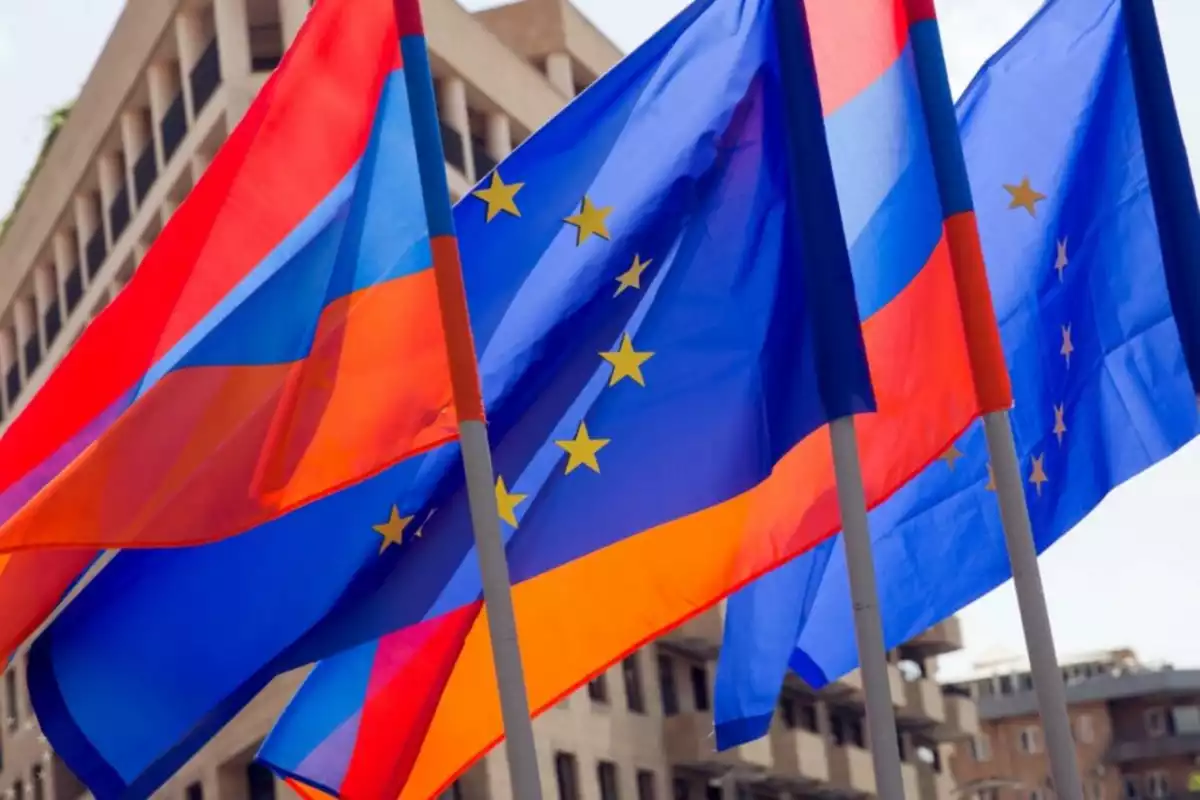
Photo credit: moldova1.md
By Tural Heybatov
On February 12, the Armenian Parliament passed a bill in its first reading to initiate the process of joining the European Union. However, this decision was not met with universal enthusiasm within the country. There remains a segment of the Armenian population capable of critically assessing the situation and looking at the long-term prospects. Many see the push for EU accession as nothing more than a publicity stunt by the government.
The bill states that "the Republic of Armenia, expressing the will of the Armenian people and setting the goal of making Armenia a safe, secure, developed, and prosperous country, declares the beginning of the process of accession to the European Union." The bill is expected to pass the second reading without obstacles, solidifying Armenia’s commitment to this path.
According to French media reports, the proposal was introduced in parliament by a civic initiative called Evrovote, which gathered the necessary number of signatures to bring it to the legislative agenda. If true, this creates the impression that Prime Minister Pashinyan’s government wants to present the EU accession drive as a grassroots movement rather than an initiative of the ruling authorities. On the other hand, Armenian media previously reported that on January 9, the Armenian Cabinet approved and submitted the bill to parliament. During a government session, Foreign Minister Ararat Mirzoyan stated that the decision to draft the document was driven by the dynamic and intensive development of Armenia-EU relations in recent years.
Armenia has been moving toward this decision for a long time, and its trajectory has accelerated as relations with Moscow have deteriorated. In Russia, Armenia’s desire to integrate into the European space is viewed as purchasing a ticket to the Titanic, with predictions that breaking ties with the Eurasian Economic Union (EAEU) could result in an 80% decline in household incomes. While Russia’s position is predictable and understandable, Armenia’s stance raises more questions. EU accession is an arduous and lengthy process, and success is not guaranteed. There is little evidence that a thorough analysis has been conducted in Armenia weighing the pros and cons of such a move. It appears that even the government itself does not fully grasp the implications but hopes for a swift resolution due to prevailing anti-Russian sentiments in Europe and political backing from a major EU player like France.
Currently, nine countries hold official EU candidate status: Turkey (since 1999), North Macedonia (2005), Montenegro (2010), Serbia (2012), Albania (2014), Bosnia and Herzegovina (2022), Moldova (2022), Ukraine (2022), and Georgia (2023). Each of these nations spent years working toward this status. Notably, the process accelerated only after the outbreak of the Russia-Ukraine war. The Baltic states were the first and last post-Soviet countries to join the EU, achieving membership in 2004 after more than a decade of arduous negotiations. Since the early 1990s, a long queue of aspirants has formed, with Armenia now placing itself at the very end-without anyone standing behind it.

Photo source : EP
Many Armenians believe that EU membership will open the doors to an El Dorado, where prosperity will automatically follow, showering the country with wealth and opportunities. However, in reality, accession to the EU does not bring a dramatic improvement in living standards-particularly for a country like Armenia. Existing challenges persist, and new ones may emerge. The EU is a project designed to serve the interests of its founding and wealthier member states, and smaller nations like Armenia must carefully analyze the consequences before diving into this sea of temptation.
Take, for example, the Baltic states, where living standards were already higher than in other Soviet republics even during the USSR era. While these countries have achieved notable macroeconomic progress as EU members and have partially reduced the income gap with Western Europe, they still struggle with some of the highest poverty and unemployment rates in the EU. Additionally, emigration levels remain high, with many Baltic citizens moving elsewhere within the bloc in search of better opportunities.
Armenia will inevitably face similar structural challenges. When Latvia, Lithuania, and Estonia joined the EU, their economies had to undergo substantial restructuring to align with EU regulations. Large industries were shut down as they failed to meet European standards. In Latvia, bus and radio factories were closed, and the once-dominant sugar beet industry-on which the country had relied even after the Soviet collapse-was dismantled due to EU policies favoring Danish sugar producers. As a result, three sugar factories were shut down, and cultivated lands were abandoned, forcing Latvia to import sugar instead.
In Estonia, meat and dairy production-sectors for which the country was renowned-declined significantly to meet EU membership criteria. Meanwhile, national banking systems in all three Baltic states have struggled, as domestic banks have been gradually edged out by Swedish financial institutions.
These are not necessarily positive or negative developments-they are simply the realities and rules of the game. Those unwilling to comply need not join. Armenia should take this into account. Experts warn that Armenian farmers will struggle to compete in the EU’s highly competitive agricultural sector. The country hopes to redirect its agricultural exports from the Eurasian market to the European one, but this is unlikely to materialize. Armenians should look closely at Ukraine’s experience-when Ukrainian agricultural products were temporarily allowed into the EU market as a gesture of support, they faced severe pushback from European farmers. And Ukraine is not even an EU member yet-it is merely a candidate.
Armenia may soon find itself navigating the same harsh realities.
Share on social media